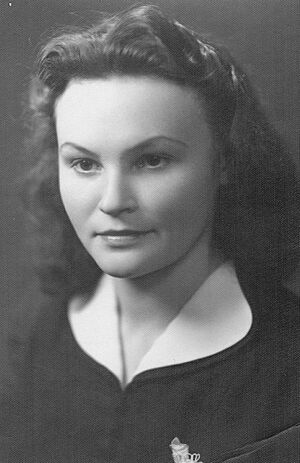Eliška Misáková facts for kids
Quick facts for kids Olympic medal record |
||
|---|---|---|
| Women's gymnastics | ||
| Representing |
||
| Gold | 1948 London | Team (awarded posthumously) |
Eliška Misáková was a talented Czech gymnast. She was born on October 12, 1926, in a place called Kojetice. Eliška was chosen to compete for her country at the 1948 Summer Olympics in London. She is remembered for her skill and for a special moment in Olympic history.
Contents
Eliška Misáková's Olympic Journey
Early Life and Dreams
Eliška Misáková grew up in Kojetice, a town in the Třebíč District of the Vysočina Region. She trained hard to become a gymnast. Her dream was to represent her country at the Olympic Games. In 1948, her dream came true when she was selected for the Czechoslovak Olympic team.
A Sudden Illness in London
When Eliška arrived in London for the 1948 Olympics, she became very ill. She was diagnosed with poliomyelitis, often called polio. Polio is a serious illness that can affect a person's ability to move and breathe. Eliška had to be isolated in a hospital. She needed a special machine called an iron lung to help her breathe. Because of her illness, another gymnast, Věra Růžičková, took her place on the team.
A Gold Medal and a Sad Farewell
Sadly, Eliška Misáková passed away on August 14, 1948, during the Olympic Games. She had been in the hospital for four days. Even though Eliška could not compete, her sister, Miloslava Misáková, was part of the Czechoslovak gymnastics team. The team went on to win the gold medal!
At the medal ceremony, the Czechoslovak flag was raised with a black border. This was a sign of mourning for Eliška. In a very special moment, Eliška Misáková was awarded an Olympic medal after her death. This is called a posthumous award. She is the only athlete ever to receive an Olympic medal this way. Because her illness was infectious, her body was cremated. Her ashes were returned to Prague in an urn.
Eliška Misáková's story is a reminder of the spirit of the Olympics. It shows the dedication of athletes and the strong bond of teamwork.
 | Jackie Robinson |
 | Jack Johnson |
 | Althea Gibson |
 | Arthur Ashe |
 | Muhammad Ali |


